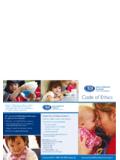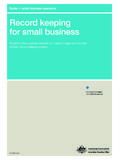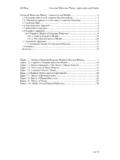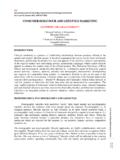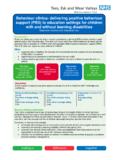Transcription of Guiding Children's Behaviour in Positive Ways
1 How does the child s age affect what you do?A child s age is important to everything you do. Just as you would not expect a baby to use a ball the same way a four or nine year old would, so you adjust the ways you speak to children and guide their Behaviour . However, regardless of a child s age there are some common guidelines. It is important to take a Positive approach and show respect for the child. It is also important to remember that your aim is for children to take increasing responsibility for Guiding their own Behaviour . Behaviour guidance is part of your relationship and daily interactions with all children , including babies and toddlers.
2 For example, you help children to learn to guide their Behaviour when you: help them to feel secure and let them know that you are there to help them let them know when they have done something that you approve of. For example, something kind or helpful encourage them to use language to express their needs, wants and feelings help them deal with conflict constructively offer materials, equipment and experiences that engage their interests give them choices and let them make some decisions respect their individual preferences for time away from the group, active play, and quiet times help them to feel good about themselves and to appreciate.
3 Care for and respect othersFDCQA - Two of the biggest challenges children face are learning acceptable Behaviour and being able to control their own Behaviour . They need to be with adults who understand this and who will help them manage these tasks. Being in a small family day care group offers children opportunities to learn about looking after themselves, other people and the world around them. Helping children learn to guide their own Behaviour can be a test for carers due to the different ages of children in the group, working with your own children alongside other people s children , different family experiences, having to make decisions about reasonable limits and how to react when children s Behaviour is is Behaviour guidance?
4 Behaviour guidance is all the things you do and say to help children learn and demonstrate acceptable Behaviour . The aim is for children to improve Guiding and controlling their own Behaviour and to rely less on carers to guide them. This takes a long time and means that the child needs to not only understand what is acceptable but also needs to develop the willpower or self control to manage their own Behaviour . The term Behaviour guidance is used by many people these days instead of the term discipline because they associate discipline with punishment.
5 Behaviour guidance is different to punishment. Punishment is doing something negative to a child when they have done something you do not approve of. Punishment does not help children learn to guide their own Behaviour , but rather teaches them to try to avoid getting caught. Punishment involves the use of power and teaches children that if you are the person with the most power you can use that over others. Punishment is often disrespectful to the child. Guiding Behaviour , on the other hand, although it requires firmness at times, is always respectful of the child.
6 As a carer you will use what you know about supporting children s learning in general to help children develop skills to guide their own Behaviour . Behaviour guidance is more than reacting when By Anne Stonehouse for NCAC children do something unacceptable. It is about supporting children to learn to do the right thing and to want to do it. As with all learning, the foundation of children s learning is the warm and caring relationship between you and the child. Factsheet # 6 Guiding children s Behaviour in Positive WaysFamily Day Care Quality Assurance Principles: , , , , , , children develop they gain skills and abilities that can help them to guide their own Behaviour .
7 These include: increasing willpower and self control they are better able to wait, share, stop, sit still, be in a group for extended amounts of time an increased understanding of appropriate and acceptable Behaviour the ability to make judgements about the context or situation and which Behaviour is appropriate to this the ability to communicate what they want and express their feelings in words improved memory a reduced need to be hands on and the ability to stand back and watch without touching the ability to respect the needs and rights of others betterThere are periods when many children have a developmental need to
8 Assert themselves. This is typical of toddlers who are establishing their sense of self and what their rights are, as well as learning the limits of their own power and learning to get along with others. Adults need to support and guide toddlers so that they feel good about themselves and begin to take into account the needs and rights of others. Toddlers and preschool-aged children are usually developing increased self control, but can struggle with this. Sometimes they simply do not have the willpower or self control to do the right thing even when they know what kind of Behaviour is expected and is influences Behaviour guidance?
9 Your scheme will no doubt have policies about Behaviour guidance. It is important that you understand those policies and how they relate to your daily practice. This will help you to talk about your Behaviour guidance philosophy and practices with families. It is important that carers play a major role in developing and revising Behaviour guidance policies so that they feel a sense of ownership of them. This can also help to ensure that the policy and strategies actually work with children . Is the situation or the environment contributing to or creating problems?
10 Some environmental factors that can contribute to inappropriate Behaviour include: too many children in too small a space, not enough equipment, a rigid schedule, limited opportunities for children to be alone or with one other child, too many or too few changes, and excessive noise, stimulation or excitement. Changing the environment or situation to support children to do the right thing and avoid or reduce problems can be my expectations appropriate?Think about whether you are expecting children to behave in ways that do not suit their current skills or serious is the Behaviour ?





